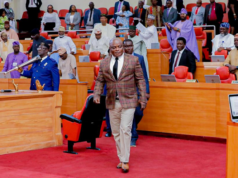
Telephone company, MTN, says it is yet to reactivate 86 per cent of phone numbers seeking reconnection several weeks after millions of owners submitted their National Identity Numbers (NIN).
The lines were barred from making calls on April 4 after the federal government ended a prolonged deadline to nudge users to link their lines with their government-issued ID numbers, a measure it says is needed to tackle insecurity.
MTN, which has the largest subscriber base in the country, said it disconnected 19 million lines following the government’s instruction. Since then, 8.7 million have since sent in their NINs as required for reconnection, but only 1.2 million were reactivated by April 25.
“As at 25 April 2022, about 8.7 million of those restricted submitted their NINs for verification, of which approximately 1.2 million have been reactivated, many of whom are high-value customers,” MTN CEO Karl Toriola said in a note to investors.
He blamed the delay on the National Identity Management Commission (NIMC) which is responsible for verification of the NINs.
“As MTN Nigeria, we continue to engage our affected subscribers while providing hardware support for the National Identity Management Commission to accelerate the verification of NINs submitted,” he said.
“We have taken significant steps to help drive NIN enrolment for subscribers who do not yet have a NIN, deploying over 4,200 points of enrolment across the country. We have also provided multiple channels to enable our customers to submit their NIN for verification and linkage.”
Millions of people who submitted their NINs after their lines were barred early April have not been reconnected across phone networks that include Airtel, Glo and 9Mobile. The phone companies as well as the ID agency, NIMC, have struggled to handle large volumes of requests and their systems have failed occasionally.
MTN said the mass disconnection has affected traffic trends and is expected to limit its service revenue in the long run, although it said it has taken steps to limit the impact.
The South Africa-headquartered firm reported N1.7 trillion as revenue in 2021. Some 7.8 per cent of that came from outgoing voice revenue from the subscribers who are yet to be reactivated, it said.
“In terms of how general traffic trends have evolved since the implementation of the directive, we have seen a drop off in traffic following our compliance with the directive,” Mr Toriola said.
“However, we have started to see a gradual recovery as the affected subscribers are reconnected to resume voice calls.”







